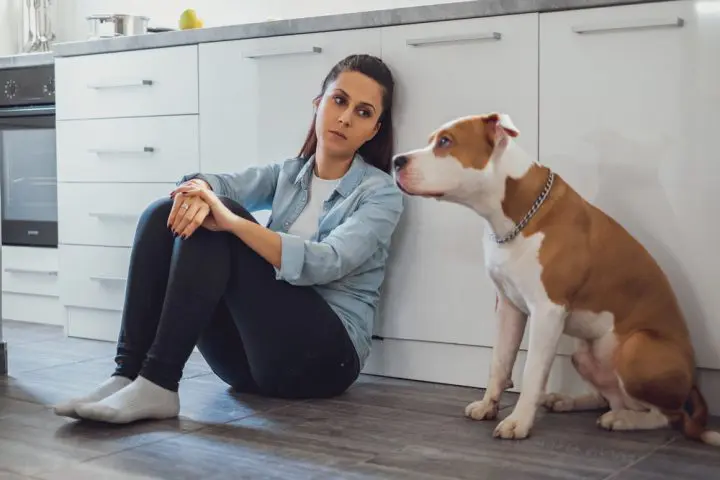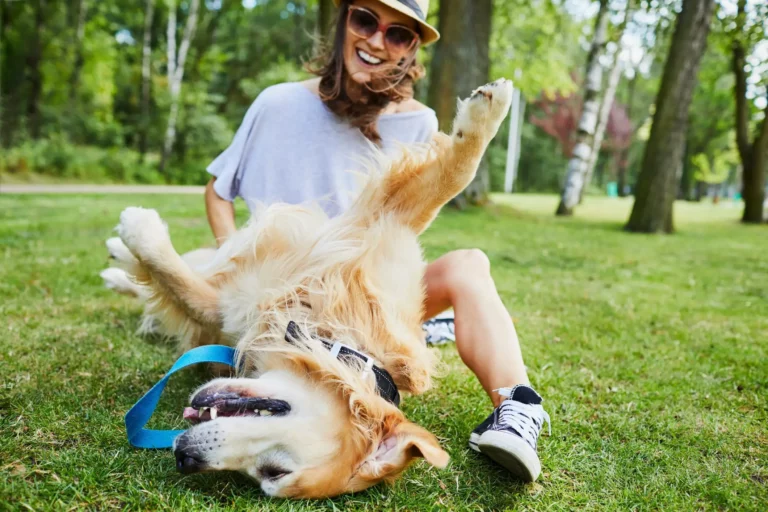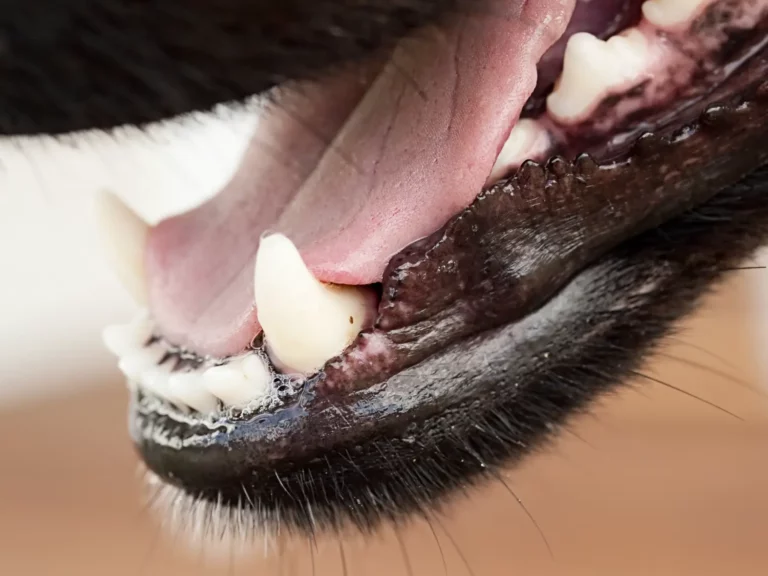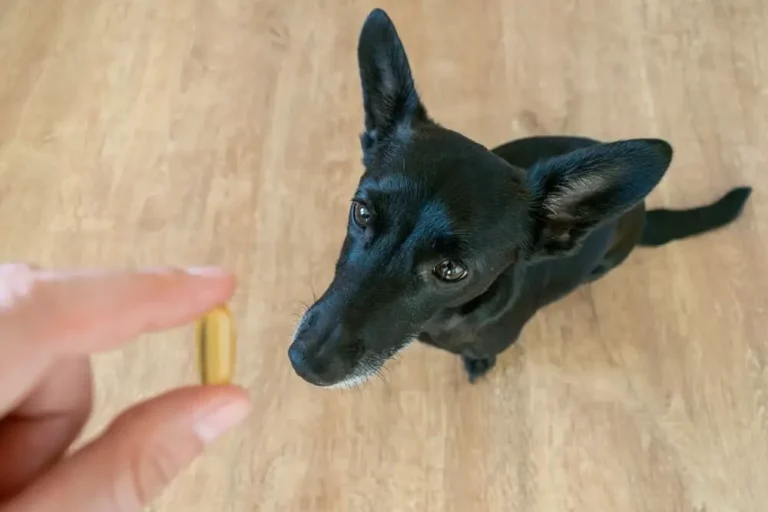My Dog Acts Weird When I’m On My Period (6 Reasons & How To Stop It)
When you’re on your period, your dog may act differently due to their remarkable sense of smell, which allows them to detect hormonal changes in your body. Some dogs may become more affectionate, restless, or attentive, while others might exhibit changes in appetite, vocalizations, or sleep patterns.
To help your dog feel more comfortable during this time, maintain a consistent routine, practice good hygiene, use scent-masking products, and provide regular exercise and mental stimulation. Be patient and understanding with your pet and seek professional guidance if needed.
Dogs have an extraordinary sense of smell that far surpasses that of humans. In fact, a dog’s olfactory abilities are estimated to be between 10,000 to 100,000 times more powerful than ours.
This incredible ability enables dogs to detect even the faintest of scents, making them valuable partners in search and rescue, law enforcement, and medical diagnostics. But things take a nasty turn when your dog sniffs your crotch or humps you during your period.
Given their incredible olfactory abilities, it is not surprising that many people wonder if dogs can sense when a woman is menstruating.
In this blog post, we will explore the science behind dogs’ ability to detect hormonal changes during menstruation, how this affects their behavior, why dogs act weird when female owners are menstruating and practical tips for dog owners to make this time of the month a more comfortable experience for both them and their furry friends.
Key takeaways
Dogs detect hormonal changes during menstrual cycles with their keen sense of smell.
These changes may cause dogs to act more protective or affectionate.
Interest in used menstrual products can pose health risks to dogs.
Dogs’ reactions to periods are normal and reflect their sensory acuteness.
Your own behavioral changes during your period can affect your dog.
Consult a vet or pet behaviorist if your dog’s behavior becomes problematic.
The Science Behind Dogs and Female Menstrual Cycle
To understand why dogs act weird when their female owners are menstruating, you need to first appreciate the science behind a dog’s olfactory ability and menstruation.
As mentioned earlier, a dog’s sense of smell is exponentially stronger than a human’s, which allows them to detect even the most subtle changes in their environment.
A dog’s olfactory system is composed of approximately 300 million scent receptors, compared to just six million in humans. Additionally, the part of a dog’s brain responsible for processing smells, the olfactory bulb, is proportionally larger than in humans, giving them a remarkable ability to analyze and interpret scents.
Dogs are known to be sensitive to hormonal changes, both in themselves and in humans. They can often pick up on subtle fluctuations in hormones, such as those that occur during a woman’s menstrual cycle.
This is likely due to the fact that hormone fluctuations can produce changes in body odor, and dogs’ powerful sense of smell enables them to detect these changes.
Pheromones, which are chemical signals released by animals to communicate with others of their species, may also play a role in a dog’s ability to sense menstruation. These scent-based signals can carry information about an individual’s reproductive status, among other things.
While it is still a topic of scientific debate whether humans produce pheromones, it is possible that dogs can detect chemical signals associated with menstruation, further contributing to their ability to sense when a woman is on her period.
In the following section, we will discuss how these olfactory abilities can lead to changes in a dog’s behavior during their owner’s menstrual cycle and the importance of understanding and addressing these changes.

Behavioral Changes in Dogs During Your Period
How dogs may react to hormonal changes in their human companions
Dogs, with their keen sense of smell, may react to the hormonal changes that occur during their owner’s menstrual cycle. These reactions can manifest in a variety of ways, depending on the individual dog’s temperament, breed, and prior experiences. Some dogs may become more protective, clingy, or attentive, while others might exhibit signs of stress or anxiety.
Examples of possible behavioral changes in dogs
The following are some examples of behavioral changes that may occur in dogs when their owner is menstruating:
- Increased affection or attention-seeking behavior
- Restlessness or difficulty settling down
- Sniffing or licking their owner’s body more than usual
- Changes in appetite or eating habits
- Vocalizing more frequently (e.g., whining or barking)
- Altered sleep patterns or increased sleepiness
It is important to note that not all dogs will exhibit these behaviors, and some may not show any noticeable changes at all. However, for those who do, being aware of these potential changes can help owners better understand and address their pets’ needs during this time.
The importance of understanding and addressing these changes
If your dog exhibits any behavioral changes during your period, it’s crucial to approach the situation with patience and understanding. Recognize that your dog may be reacting to the hormonal changes they sense in you and may not understand why these changes are happening. Try to maintain your regular routines and provide your dog with plenty of exercise, mental stimulation, and affection to help them feel secure and at ease.

In the next section, we will explore some of the reasons for this change in behavior.
Why Does My Dog Act Weird When I’m On My Period
Your dog spends most of its time with you, and when there is any change in your smell or hormones, your dog is the one who identifies it right away, not you.
Your periods significantly affect the smell of your sweat and body. The menstrual blood is also smelly enough to make the dog curious about it.
There are 6 common reasons that addresses the question “why does my dog acts weird when I’m on my period? ” :
Reason 1: Menstrual Blood and Canine Scavenger Instinct
Dogs are natural scavengers who are attracted to the smell of blood. When you’re on your period, the most typical strange behavior canines display is crotch-sniffing. When their keen nose detects blood, they rush to you and sniff your private part regardless of the people around.
Physical punishment is never the best way to correct your dog as this may ruin the relationship you have with your furry companion; positive reinforcement is the most effective technique.
Reason 2: You May Be The Weird One, Not Your Fido.
When you are on your period, you go through a lot. The mood swings, tantrums, eating frenzies, and being a couch potato. Dogs are animals of routine, and when they see a change in their owner’s routine, they get baffled and confused.
A woman shows a lot of strange behaviors and acts that confuse their furry friend, making him respond in an unusual manner.
Reason 3: It’s Just A Response To Pheromones
When a female dog is in heat, it secretes pheromones to attract males and start the reproductive process. Dogs become accustomed to these pheromones as a stimulant for sexual activities.
But when dogs sniff the female human pheromones, they may react somewhat differently, perhaps, because dog pheromones do not contain exactly the same chemical composition as those of humans. Once your dog sniffs your body during your period, they are able to pick up these pheromones producing all manner of behaviors.
Reason 4: They Sense Your Fertility
Your periods tell a lot about your body to your dog than you can know yourself. With their powerful olfactory senses, dogs can smell menstrual blood and detect hormonal fluctuations in their female owners.
Most times, intact female dogs may see you as a threat that they may be posed with.
However, their masculine counterparts tend to become clingy and protective of you, or display aggression but often directed toward other male dogs they see as a threat. Their territorial instincts might kick in and they can mark you by rubbing their face and body all over you.
Reason 5: Your Dog Is Hungry
Dogs are opportunity eaters, and they tend to eat anything they can. When you have a hungry pooch at home and because of your period cramps, you are unable to feed him on time, you are brewing up strange canine behaviors.
Due to their heightened cravings brought about by hunger, dogs can instinctively be attracted to your crotch where there is a fresh smell of blood. It is better to feed your dogs to save yourself from this embarrassing situation.
Reason 6: Information-seeking Behavior
The simplest logical explanation for the dog’s strange behavior in your menstruation is their curiosity. We know that dogs love to explore their environment, and they follow every scent around to know the source.
Their curiosity can lead them to sniffing your crotch or digging up trash cans where period products were discarded. And they may eventually rip them up and even swallow them. If you catch your pooch eating your bloody tampons or pad, it’s crucial to talk to your vet immediately to seek resolution.
In the next section, we will explore how other animals react to menstruation and how their reactions compare to those of dogs.
How Other Animals React to Menstruation
Examples of animals that can sense hormonal changes
Dogs are not the only animals capable of sensing hormonal changes during menstruation. Some other examples of animals that may be sensitive to these changes include:
- Cats: Similar to dogs, cats have a highly developed sense of smell and may react to the hormonal fluctuations in their owners. They may become more affectionate, vocal, or even exhibit marking behaviors in response to the scents they detect.
- Horses: Horses are known to be sensitive to human emotions and may pick up on the emotional changes some women experience during their menstrual cycle. This sensitivity can lead to horses being more cautious or attentive around menstruating riders.
- Rodents: Some rodents, such as rats and mice, have been shown to react to the scent of menstrual blood. While this is not necessarily a reaction to hormonal changes, it does indicate that these animals can detect the presence of menstruation.
How different animals react to menstruation in humans
The way animals react to menstruation in humans can vary widely depending on the species, individual animal, and specific circumstances. Some animals may exhibit curiosity, while others may react with caution, anxiety, or even aggression. It is essential to understand that these reactions may not necessarily be a direct response to menstruation but rather a result of the animal picking up on the associated hormonal or emotional changes.
In the following section, we will provide some practical tips for dog owners to help them navigate this time of the month with their canine companions, ensuring a more comfortable and harmonious experience for both parties.
No products found.
Practical Tips for Dog Owners During Their Period
1. Ways to minimize any discomfort for both you and your dog
Navigating your menstrual cycle with your furry friend can be made more comfortable by following some practical tips that benefit both you and your dog. Here are a few suggestions to help make this time of the month as smooth as possible:
- Maintain a consistent routine: Dogs thrive on routine, and sticking to a consistent schedule can provide them with a sense of security during your period. Ensure that you continue to provide regular walks, playtime, and mealtimes to maintain a sense of normalcy.
- Use scent-masking products: If you’re concerned about your dog’s reactions to the scent of your period, consider using scent-masking products such as menstrual cups, scented pads, or tampons. These can help reduce any odors that might be triggering your dog’s behavior.
- Practice good hygiene: Maintaining good personal hygiene, particularly during menstruation, can help minimize any scent that might be causing your dog’s heightened interest. Shower regularly and change your menstrual products frequently to keep odors at bay.
2. Establishing a healthy routine to manage your dog’s behavior
If your dog displays behavioral changes during your period, it’s essential to establish a healthy routine to help manage these changes effectively. Some strategies include:
- Regular exercise: Ensuring your dog gets enough physical activity can help alleviate stress and anxiety they may experience during this time. A well-exercised dog is more likely to be calm and relaxed.
- Mental stimulation: Providing your dog with mental stimulation, such as puzzle toys, training sessions, or scent games, can help keep their mind occupied and redirect their focus away from your hormonal changes.
- Positive reinforcement: Reward your dog for displaying calm, relaxed behavior during your period. This can help reinforce the idea that there’s nothing to be concerned about and encourage them to remain calm in the future.
3. Creating a supportive environment for you and your pet
Finally, it’s essential to create a supportive environment for both you and your pet during this time. This includes:
- Being patient and understanding: Remember that your dog may not understand the changes happening and may simply be reacting to the hormonal shifts they sense in you. Be patient and understanding, and try not to take their behavior personally.
- Prioritizing self-care: Take care of yourself during this time, as your own emotional state can influence your dog’s behavior. Practice self-care, such as taking time to relax, eating healthily, and getting enough sleep, to help you and your dog navigate this time more comfortably.
- Seeking professional help if needed: If your dog’s behavior becomes concerning or unmanageable, consider consulting a veterinarian or professional dog trainer for guidance and support.
By following these tips, you can help ensure a more comfortable and harmonious experience for both you and your dog during your menstrual cycle.
My Dog Acts Aggressive When I’m On My Period
If your dog acts aggressive when you’re on your period, it’s likely a response to the hormonal changes in your body and the scents produced during menstruation. Again, dogs have an exceptional sense of smell, which allows them to detect even subtle changes in their environment, including those related to hormones. Some dogs may become more protective, anxious, or stressed, leading to aggressive behavior.
To help address and manage your dog’s aggression during your period, consider the following steps:
- Maintain a consistent routine: Keeping a regular schedule for feeding, exercise, and playtime can provide your dog with a sense of stability and security.
- Use scent-masking products: Minimize the scents associated with menstruation by using menstrual cups, scented pads, or tampons.
- Practice good hygiene: Shower regularly and change your menstrual products frequently to reduce any odors that might be causing your dog’s heightened interest and aggression.
- Provide a safe space: Ensure your dog has a quiet, comfortable area to retreat to when they feel overwhelmed or anxious.
- Use positive reinforcement: Reward your dog for calm, non-aggressive behavior during your period to encourage them to remain composed in the future.
- Consult a professional: If your dog’s aggression becomes unmanageable or poses a risk to your safety, consider seeking advice from a veterinarian or professional dog trainer.
Remember to be patient and understanding with your dog during this time. Their aggressive behavior is likely a reaction to the hormonal changes they sense in you, and they may not understand why these changes are happening.

Why Does My Dog Not Like Me When I’m On My Period?
Your dog are hardwired to like you based on your behavior or routine. But when you are menstruating, your blood chemistry changes, affecting your mood and regular behavior. When your pooch senses any abnormal behavior, the pooch will get confused and may become less affectionate toward you.
To keep things the same, you must create a quality time for you and your pooch. You and your canine friend can perform a lot of activities together, like jogging, swimming, fetch, and agility training.
My Dog Is Obsessed With Me And Follows Me Everywhere During My Period
Because dogs are almost always attracted to the pheromones given off by their female owners, they may begin to love you a little too much. Hence, they’ll crave more quality time with you or try to sniff your crotch, lick, hump or cuddle you.
It could be that they see you as a source of comfort and relief, but on the other hand, their protective instincts may become heightened at this time causing them to follow us with the intent to guard us. Some dog breeds often tagged “Velcro dogs” tend to be more clingy and closer to their menstruating female owners.
How To Stop Your Dog From Acting Weird During Your Period
If you want to keep the dog as normal as possible, you need to stay normal concerning your behavior and routine.
Pheromones will attract the dog during periods, and the canine will come to your crotch. You can place your hand in front of your body and let the dog sniff your hand to stop it.
Another tried-and-true method to correct these weird behaviors is by channeling their sense of smell to a more interesting smell. You can also engage them in several fun scent games or scent their toys and let them play with it. There are also a lot of dog appeasing pheromones in the market that could be helpful in calming your dog and relieving his stress.
Please keep your dog happy and healthy by giving them their nutrient-rich food. Never skip mealtimes so your pooch doesn’t embark on the scavenger hunt and explore your pads.
Why Does My Dog Rip Up My Period Pads?
Almost every dog is a scavenger by nature with a mixture of curiosity and an excellent sense of smell. The scent of your blood and pheromones can make these fluffy creatures dig deep into the trash cans to fetch sanitary belongings and rip them apart before devouring them.
Your dog’s fur can also be stained because of the mess they make out of your bloody period items.
When you have a dog around you in the house, you must carefully dispose of your tampons, pads and other period items. Also make sure that your trash cans are sealed or covered with a tight dog-proof lid. It should not be placed far from the reach of your furry friend.
If your dog has eaten a tampon without tearing it, consult your vet for induced vomiting; otherwise, it can result in fatal intestinal blockage.
No products found.
Final Thoughts
The intricate bond between humans and dogs is beautifully highlighted by their sensitivity to changes in our bodies, including those that occur during menstruation.
As we’ve explored, a dog’s heightened sense of smell can result in behavioral changes in response to the hormonal fluctuations experienced by their owner.
By understanding these reactions and implementing practical strategies such as maintaining routines, ensuring good hygiene, and providing physical and mental stimulation, we can help our canine companions feel more at ease during this time.
Ultimately, fostering a harmonious and supportive relationship with our pets deepens the remarkable connection we share with them and strengthens the unbreakable bond between humans and dogs.
Additional Sources:
- Asa, C. S., & Valdespino, C. (1998). Canine olfaction: Scent, sign, and situation. In Domestic Dog Cognition and Behavior (pp. 3-29). Springer, Berlin, Heidelberg. https://doi.org/10.1007/978-3-642-53994-7_1
- Siniscalchi, M., d’Ingeo, S., Minunno, M., & Quaranta, A. (2018). Communication in dogs. Animals, 8(8), 131. https://doi.org/10.3390/ani8080131
- King, T., Marston, L. C., & Bennett, P. C. (2012). Breeding dogs for beauty and behaviour: Why scientists need to do more to develop valid and reliable behaviour assessments for dogs kept as companions. Applied Animal Behaviour Science, 137(1-2), 1-12. https://doi.org/10.1016/j.applanim.2011.11.016







